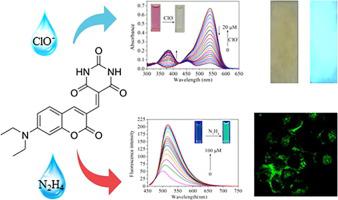A 7-diethylaminocoumarin-based chemosensor with barbituric acid for hypochlorite and hydrazine
Microchemical Journal Pub Date : 2020-08-30 , DOI: 10.1016/j.microc.2020.105461
Huimin Wu, Wenyan Zhang, Yinghao Wu, Nan Liu, Fengjuan Meng, Ya Xie, Liqiang Yan
 |
A chemosensor was synthesized conveniently by the condensation between 7-diethylaminocoumarin and barbituric acid, which was used successfully for the detection of hypochlorite and hydrazine with excellent performances. This chemosensor underwent remarkable color change and turn off fluorescence in solution, while revealed turn on fluorescence on the filter paper in the presence of hypochlorite. In addition, it exhibited obvious fluorescence enhancement in solution, while no fluorescence change on the test paper after addition of N2H4. As a result, this chemosensor could be a potential candidate for hypochlorite and hydrazine in different media through two distinct response modes. It could realize the detection of hypochlorite in water with a low detection concentration of 2 μM by test strip, and trace hydrazine in aqueous solution and living HepG2 cells by the mean of fluorescence signal. Moreover, the sensing mechanisms of this chemosensor towards hypochlorite and hydrazine were suggested by HRMS and 1H NMR spectra, in which the coumarin structure was destroyed by hypochlorite and the barbituric acid was removed by hydrazine, respectively.
